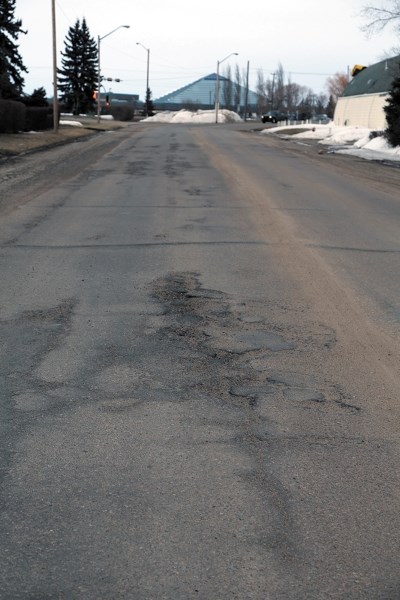As the snow melts away, Westlock residents will likely start to see public works crews out on the streets working to smooth out the potholes.
Mayor Bruce Lennon said while the major capital projects may be scaled back this year to help deal with financial pressures brought on by changes in Municipal Sustainability Initiative funding, the town’s road maintenance program won’t be affected.
“We didn’t reduce that part of the budget and we’ve instructed our director of planning that the priority is to maintain the roads,” Lennon said, adding the budget for road maintenance is around $300,000.
In particular, he said the potholes on the town’s roads will be patched in the coming weeks and months, making them smoother to drive on, as well as helping make sure they don’t get any worse then they currently are.
“If you don’t get them patched, it just gets worse and worse and a small problem becomes a big problem,” Lennon said.
Work on filling potholes has already started, he said, noting he’s seen some workers pouring asphalt on some sections of road recently. However, the work won’t accelerate for a while yet, given last Friday’s snow.
“I assume it will start full-blown pretty soon,” Lennon said, adding it’s almost a full-time job for the workers who patch the roads year round.
This year, Lennon said the town has a few stretches of road that are ready to be overhauled to various degrees.
All the engineering work has been completed and the projects are ready to be tendered, but the decision has not been made whether to actually put the projects out to tender.
The roads that are ready to go include 101 Avenue, 102 Avenue, the 104 Avenue service road in front of the pool and a portion of 104 Street, said town CAO Darrell Garceau.
Lennon said those specific projects and other similar ones are on the town’s regular roadwork plan, and typically cost in the range of $1-2 million.
At the moment, he said the town is looking at possibly getting better value for its money by looking at doing $4 million worth of roadwork every other year instead of $2 million every year.
The reason is that it could reduce start-up costs because the contractors would already be in town and would not need to move their equipment in and out of Westlock every year.



